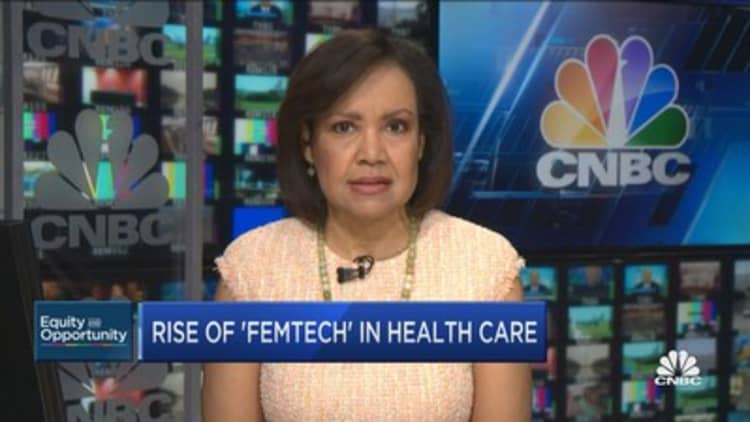Investors are ignoring a huge subsection of tech because it’s considered “taboo” – despite the fact that it is set to be worth $1 trillion by 2027.
The FemTech sector includes all innovations designed to solve health issues suffered solely, differently, or disproportionately by women. It covers everything from health during pregnancy and the menopause, to Alzheimer’s and HIV.
Women make up more than 50% of the global population, which means the target market for products focusing on their health is massive. But just 3.3% of digital health investment in the U.S. went towards women’s health between 2011 and 2020, according to digital consultancy Rock Health.
And nurturing innovation within the female health space doesn’t just benefit women.
Research by Women’s Health Access Matters, a nonprofit organization focused on funding for women’s health research, suggests that a $300 million investment into improving female health could generate around $13 billion for the global economy.
Research by Women’s Health Access Matters suggests that a $300 million investment into improving female health could generate around $13 billion.
De Agostini Picture Library | De Agostini | Getty Images
“The opportunities and the potential for value creation of investing in this area is huge,” Karen Taylor, research director of the Centre for Health Solutions at Deloitte told CNBC.
“So I think if there was some more homework done by some of these investors, they’d understand why this is an area that is ripe for growth and investment.
“They just didn’t really get it”
Tania Boler created Elvie, a tech company focused on women’s health, in 2013 after she found a lack of products designed for new mothers. Elvie’s main products are pelvic floor trainers and portable breast pumps.
But not everybody took her new business seriously.
“To be completely honest, the tech industry thought it was a joke,” Boler told CNBC.
“They just didn’t really get it … [and] in quite a few women’s health issues, the problem is that because there’s a lack of education, there’s a lack of demand. From an investment point of view it’s not clear what the thesis is,” Boler said.
Personal understanding of a product is often key for investors, but the stats show that most investment decisions are made by men. A 2022 report by European Women in VC, a collection of senior female venture capitalists, found that just 15% of VC general partners were female.
Despite the barriers, Elvie has gone big. It is now one of the largest companies in the FemTech space and has a revenue of $100 million. There are examples of women who have run marathons and performed surgery while expressing milk using Elvie pumps, which CEO Tania Boler said highlights the human impact of investing in women’s health.
“We went with a very strong message of empowerment, but at the same time we tackle the taboos head-on, we don’t shy away from that. And that starts the conversation,” Boler said.
The issue of not understanding women’s health – and the importance of female-specific health solutions – has deeper roots.
“Because it’s been such a taboo topic, it’s really hard to overcome,” Valerie Evans, consumer investor at venture capital fund The Craftory, said.
“Not because [investors] don’t want to know and not because they’re purposefully ignorant, but I think it’s an overall societal problem that sort of permeates the investing world.”
And while the number of female investors is limited, the gender balance within company teams can also impact how difficult it is to get backing.
‘Being angry feminists hasn’t worked’
More than 70% of FemTech companies have at least one female founder, compared to the 20% average, according to McKinsey & Company.
But that means the odds are stacked against them.
Less than 3% of venture capitalist funds went to female-led startups in 2020, according to data from business school INSEAD, while female entrepreneurs are 63% less likely to get VC funding than men.
Deloitte’s Taylor said female founders also generally ask investors for less money than their male counterparts, which could be harming their prospects within the space.
“There’s lots of research that shows women tend to be much more honest and play down what they believe is the potential for their innovation,” she said. “Men are notorious for big sales and investors are used to it.”
Economies will grow when women can birth taxpayers and not die in the process
Brittany Barreto
Founder and CEO of FemHealth Insights
For Brittany Barreto, founder of FemTech analytics platform FemHealth Insights, these figures emphasize the importance of startups taking accurate data to investors — so if they can’t appeal to personal experience (because the VCs are men), they can provide robust information.
“It was very important that we stick to the data part of all of this because if we’re just angry feminists, that hasn’t worked yet. So I was like: let’s be scientists and let’s be business people,” Barreto said.
And the FemTech sector is growing at an astounding rate. More than 60% of FemTech startups were founded in the five years leading to 2022, and there has been a 1,000% increase in the number of businesses in the space over the last 10 years, according to FemHealth Insights research.

These growth rates — despite myriad obstacles — are encouraging for an industry that has been struggling to gain traction.
“I am incredibly optimistic for the future of women’s health,” Barreto said, stressing the huge potential benefits for the world.
“The economic potential for countries if they can empower women to feel better, to live longer, live with more mobility?” she said. “Women have money. Economies will grow if we make women healthy.”


